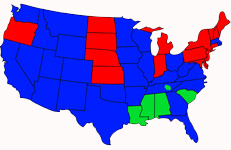Election 1948: Dewey Defeats Diddly Squat
DEWEY DEFEATS TRUMAN may be the most famous newspaper headline in the history of the medium. No one really remembers, though, why the president who won WWII was so defeatable, and why a guy whose name reminds you of a warm, wet morning was such a shoe-in for president. Ooh please, please let me tell you all about it.
The Contenders

President Harry S Truman (Democrat-MO) – Even though he won the war, Truman had trouble escaping FDR’s sizeable shadow. He was just a failed haberdasher from Missouri who was thrown on the ticket at the last minute because then VP Wallace was too liberal. His post-war record was hardly stellar, and his regular-guy attitude hardly matched the presidentiality of his predecessor.
Governor Thomas Edmund Dewey (Republican-NY) – In 1944, he led an impressive campaign against the unbeatable Roosevelt. When Truman turned out as banal as everyone assumed he was, this towering, powerful New Yorker’s victory seemed assured.
Former Vice President Henry Agard Wallace (Progressive-IO) – Still pissed that he was replaced on the 1944 ticket, therefore not becoming president when FDR died, Wallace spent the rest of his life as Truman’s harshest critic. He basically re-formed the Progressive Party just to take Truman down.
Governor James Strom Thurmond (Dixiecrat-SC) – Before he became that bat shit crazy, racist 100-year-old Senator, Strom Thurmond was a bat shit crazy, racist presidential candidate. Like what put Breckinridge on the ticket in 1860, Democrats stormed out of the convention over Truman’s stance on civil rights.
The Fight
Let’s just list the reasons Truman didn’t have a chance:
Strike 1: A failing economy. When the bomb quickly ended the war, the economy was unprepared for the flood of veterans’ suddenly returning home and an end to wartime production, leading to wide-spread strikes. All blamed on Truman.
Strike 2: He alienated labor unions. To quell a national railroad strike, Truman threatened to draft the union members into the military. Organized labor is to this day the core of the Democratic base, and now they hated him.
Strike 3: He recognized the state of Israel. He did it against the advice of Sec. of State George Marshall, who was so popular at the time, Truman insisted the plan to rebuild Europe be named after him, instead of himself. So now Marshall supporters were against him too.
Strike 4: He de-segregated the military. The Democratic Party was still, in 1948, the party of the South. Even super liberal Wilson was super racist. So, yeah, Truman, as a human, good call. As a Democrat, not so much.
Strike 5: He was up against two Democrats. Even before the civil rights thing, Truman had to face former Democratic VP Wallace, but now he had to also face Thurmond, who hoped to sweep Southern Democrats.
 Refusing to acknowledge his election was anything but assured, Truman went on a national train tour charming the pants off everyone he met. He promised a Fair Deal for all Americans, in order to invoke FDR’s New Deal. He charged Dewey would undo FDR’s work, and return the country to the unstable economy that led to the Depression. That, Truman said, would be good for the Communists.
Refusing to acknowledge his election was anything but assured, Truman went on a national train tour charming the pants off everyone he met. He promised a Fair Deal for all Americans, in order to invoke FDR’s New Deal. He charged Dewey would undo FDR’s work, and return the country to the unstable economy that led to the Depression. That, Truman said, would be good for the Communists.
In contrast, Dewey hardly campaigned at all. Back in ’44 the campaign devolved into a mudslinging contest with the then President Roosevelt. In '48, though, he was so far ahead in the polls, his strategists figured the best way to win was to avoid offending anyone. One journalist summed up Dewey's four major speeches with the following quotes, “Agriculture is important. Our rivers are full of fish. You cannot have freedom without liberty. Our future lies ahead.”
The Title
People turned out in droves to vote for Truman, even though they had no hopes that he’d win. They just liked him and wanted to show him people supported him. Add to that, his overwhelming support in the black and Jewish communities. In sharp contrast, Dewey’s bland campaign and centrist leanings didn’t exactly inspire people to get out the vote. Hardly a resounding re-election, Truman’s second term was an all-around failure, topped off by the disastrous Korean War.
In the mid-‘60s, Dewey became disillusioned with how conservative the Republican party had become and retired from public service. His most lasting contribution came in 1952, when he convinced Eisenhower to make his running mate freshman California Senator Richard Nixon.
Next Up – Election 1960: This Guy’s Pretty, That Guy’s Sweaty
The Contenders

President Harry S Truman (Democrat-MO) – Even though he won the war, Truman had trouble escaping FDR’s sizeable shadow. He was just a failed haberdasher from Missouri who was thrown on the ticket at the last minute because then VP Wallace was too liberal. His post-war record was hardly stellar, and his regular-guy attitude hardly matched the presidentiality of his predecessor.
Governor Thomas Edmund Dewey (Republican-NY) – In 1944, he led an impressive campaign against the unbeatable Roosevelt. When Truman turned out as banal as everyone assumed he was, this towering, powerful New Yorker’s victory seemed assured.
Former Vice President Henry Agard Wallace (Progressive-IO) – Still pissed that he was replaced on the 1944 ticket, therefore not becoming president when FDR died, Wallace spent the rest of his life as Truman’s harshest critic. He basically re-formed the Progressive Party just to take Truman down.
Governor James Strom Thurmond (Dixiecrat-SC) – Before he became that bat shit crazy, racist 100-year-old Senator, Strom Thurmond was a bat shit crazy, racist presidential candidate. Like what put Breckinridge on the ticket in 1860, Democrats stormed out of the convention over Truman’s stance on civil rights.
The Fight
Let’s just list the reasons Truman didn’t have a chance:
Strike 1: A failing economy. When the bomb quickly ended the war, the economy was unprepared for the flood of veterans’ suddenly returning home and an end to wartime production, leading to wide-spread strikes. All blamed on Truman.
Strike 2: He alienated labor unions. To quell a national railroad strike, Truman threatened to draft the union members into the military. Organized labor is to this day the core of the Democratic base, and now they hated him.
Strike 3: He recognized the state of Israel. He did it against the advice of Sec. of State George Marshall, who was so popular at the time, Truman insisted the plan to rebuild Europe be named after him, instead of himself. So now Marshall supporters were against him too.
Strike 4: He de-segregated the military. The Democratic Party was still, in 1948, the party of the South. Even super liberal Wilson was super racist. So, yeah, Truman, as a human, good call. As a Democrat, not so much.
Strike 5: He was up against two Democrats. Even before the civil rights thing, Truman had to face former Democratic VP Wallace, but now he had to also face Thurmond, who hoped to sweep Southern Democrats.
 Refusing to acknowledge his election was anything but assured, Truman went on a national train tour charming the pants off everyone he met. He promised a Fair Deal for all Americans, in order to invoke FDR’s New Deal. He charged Dewey would undo FDR’s work, and return the country to the unstable economy that led to the Depression. That, Truman said, would be good for the Communists.
Refusing to acknowledge his election was anything but assured, Truman went on a national train tour charming the pants off everyone he met. He promised a Fair Deal for all Americans, in order to invoke FDR’s New Deal. He charged Dewey would undo FDR’s work, and return the country to the unstable economy that led to the Depression. That, Truman said, would be good for the Communists.In contrast, Dewey hardly campaigned at all. Back in ’44 the campaign devolved into a mudslinging contest with the then President Roosevelt. In '48, though, he was so far ahead in the polls, his strategists figured the best way to win was to avoid offending anyone. One journalist summed up Dewey's four major speeches with the following quotes, “Agriculture is important. Our rivers are full of fish. You cannot have freedom without liberty. Our future lies ahead.”
The Title
People turned out in droves to vote for Truman, even though they had no hopes that he’d win. They just liked him and wanted to show him people supported him. Add to that, his overwhelming support in the black and Jewish communities. In sharp contrast, Dewey’s bland campaign and centrist leanings didn’t exactly inspire people to get out the vote. Hardly a resounding re-election, Truman’s second term was an all-around failure, topped off by the disastrous Korean War.
In the mid-‘60s, Dewey became disillusioned with how conservative the Republican party had become and retired from public service. His most lasting contribution came in 1952, when he convinced Eisenhower to make his running mate freshman California Senator Richard Nixon.
Next Up – Election 1960: This Guy’s Pretty, That Guy’s Sweaty
Labels: elections, presidents





 This blog is not to be taken seriously. Seriously. I take this seriously, but you shouldn't. You should do what you want, but you'll probably enjoy this more if you don't take anything I say seriously. I mean, I mean what I say, but it's not serious. Oh also, swearing is hilarious. It shouldn't be, but it is.
This blog is not to be taken seriously. Seriously. I take this seriously, but you shouldn't. You should do what you want, but you'll probably enjoy this more if you don't take anything I say seriously. I mean, I mean what I say, but it's not serious. Oh also, swearing is hilarious. It shouldn't be, but it is.


0 Comments:
Post a Comment
Subscribe to Post Comments [Atom]
<< Home